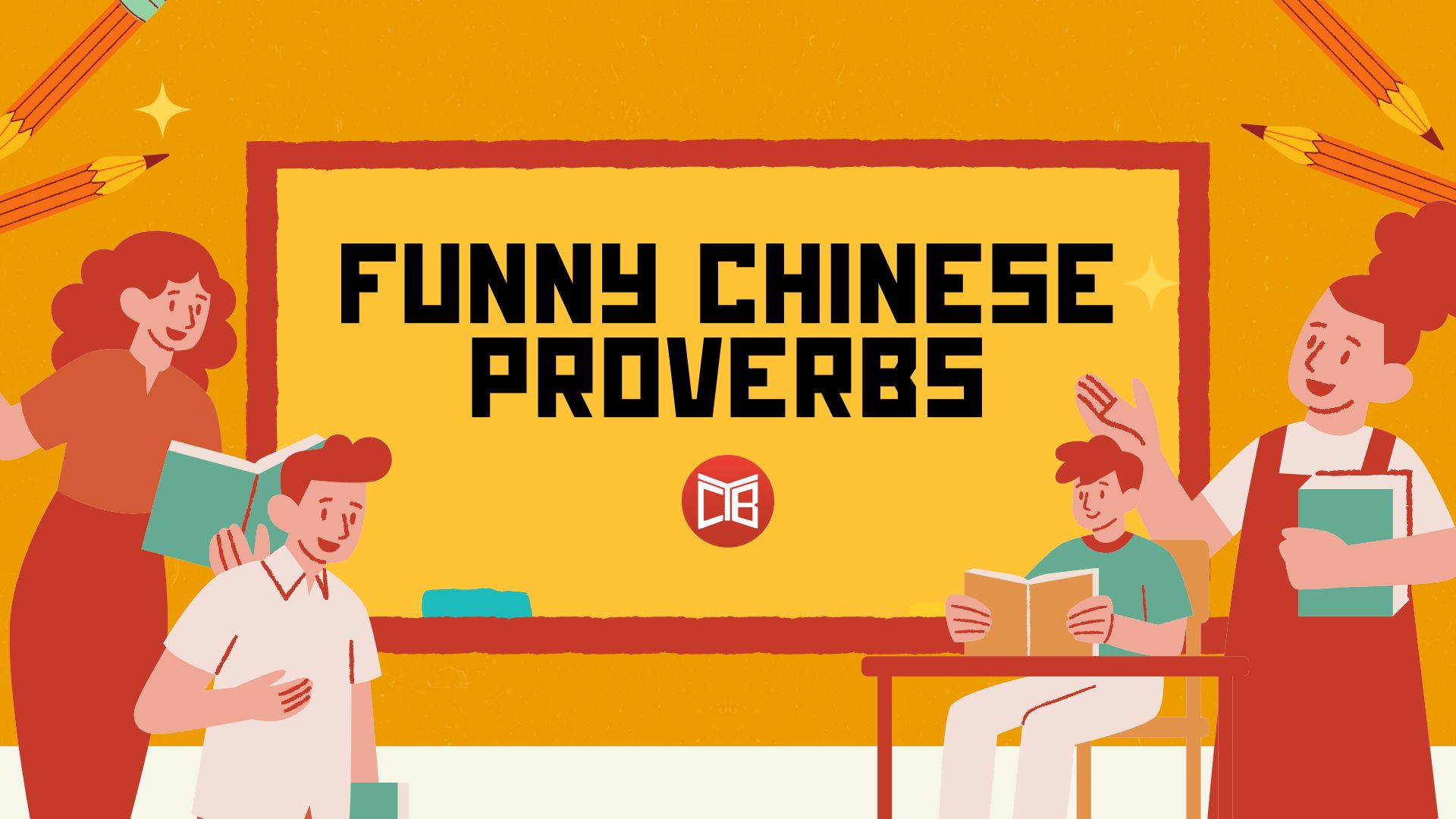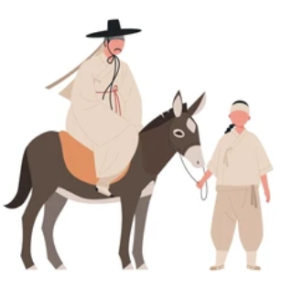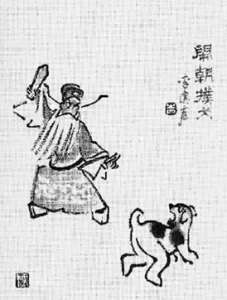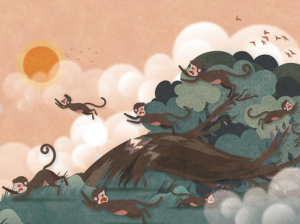
Learning Chinese doesn’t have to be all serious business. Sometimes, the best part of studying the language is the weird, hilarious things people thousands of years ago decided were worth saying out loud.
Enter: funny Chinese proverbs.
As someone who translates Chinese web novels for a living, I come across all kinds of interesting proverbs. Some of them make me pause, laugh out loud, and then spend fifteen minutes Googling ancient historical references.
These idioms (成语 or 俗语) can be poetic and wise… but when translated literally? Pure comedy gold.
Here are 12 funny Chinese proverbs to make your Chinese learning journey slightly more ridiculous (and a lot more fun).

A Chicken That Fell Into Soup
- Chinese characters: 落汤鸡
- Pinyin: luò tāng jī
- Actual meaning: Someone who’s soaking wet
- Why it’s funny: Because why the heck is there a chicken in your soup that’s not dead yet?
You read that right. The characters literally mean “fall,” “hot soup,” and “chicken.” Imagine stepping outside into a storm with no umbrella and five seconds later, you’re dripping wet. You look like… well, a chicken that fell into soup. Not cooked. Not eaten. Just confused, wet, and probably regretting its life choices.
Basically, this is China’s version of “drowned rat,” but more delicious-sounding.
As a translator, I’ve had characters run through a storm only to be compared to this sad chicken. The first time I translated it literally, my editor messaged me: “Wait… the chicken fell into soup?” We still joke about it.
Usage: 他全身湿透了,像只落汤鸡。
He was soaked from head to toe, like a chicken that fell into soup.
Heavenly Flowers Falling in Chaos
- Chinese characters: 天花乱坠
- Pinyin: tiān huā luàn zhuì
- Actual meaning: Someone talks a lot of pretty nonsense
- Why it’s funny: It sounds like a fantasy novel title but really means “this guy’s full of BS”
You know that one friend who gives long, flowery speeches, but doesn’t actually say anything? That’s this proverb in action. They’re basically throwing verbal confetti into the air while you’re just trying to get to the point.
Bonus: this is a great insult if you want to sound classy while being shady.
Usage: 他说得天花乱坠,结果一点都没做到。
He talked like flowers were chaotically falling from heaven, but didn’t do a thing.

Ride a Donkey While Searching for a Horse
- Chinese character: 骑驴找马
- Pinyin: qí lǘ zhǎo mǎ
- Actual meaning: Settling temporarily while searching for something better
- Why it’s funny: It’s so painfully relatable it hurts
You’re on a date with someone nice but… meh. Meanwhile, you’re swiping on Tinder under the table hoping Prince(ss) Charming shows up. Yup. You’re on the donkey.
We’ve all been the donkey rider. No shame. Just don’t forget to eventually get off and upgrade.
Usage: 他现在的女朋友只是骑驴找马而已。
His current girlfriend? Just a donkey while he’s hunting horses.
A bit savage, yes. But hey, we don’t judge.

A Dog Bites Lü Dongbin
- Chinese characters: 狗咬吕洞宾
- Pinyin: gǒu yǎo Lǚ Dòngbīn
- Actual meaning: You try to help someone and they turn on you
- Why it’s funny: Because it’s ancient mythology meets modern-day ungrateful behavior
This proverb refers to Lü Dongbin, one of the Eight Immortals. According to legend, he tried to help a dog, and it bit him instead. Classic.
Modern meaning? You try to be a good person… and end up regretting it. We’ve all been there.
Usage: 我帮了他忙,结果还被骂,真是狗咬吕洞宾。
I helped him, but he yelled at me. Talk about biting the immortal hand that feeds you.
It’s Hard to Get Off the Tiger Once You’re on It
- Chinese characters: 骑虎难下
- Pinyin: qí hǔ nán xià
- Meaning: Being stuck in a difficult situation you can’t escape
- Why it’s funny: Because the mental image is chef’s kiss
Imagine you’re riding a tiger. Now, try getting off without being eaten. Good luck.
This is the proverb for every time you said, “Sure, I’ll help plan the party,” and now you’re the unpaid event coordinator making centerpieces at 2 a.m.
Usage: 现在项目都开始了,已经骑虎难下了。
The project has started. We’re stuck riding the tiger now.
You Drew a Snake, Then Gave It Legs
- Chinese characters: 画蛇添足
- Pinyin: huà shé tiān zú
- Actual meaning: You ruined something by doing too much
- Why it’s funny: Because SNAKES DON’T NEED LEGS, JERRY
You had a perfectly fine snake drawing. Then you got all extra and decided to slap some legs on it like it was a lizard. WHY.
This one’s about ruining something by adding too much. Like when you make a great dish, then dump in three extra spices for “flavor” and now it tastes like regret.
Perfect for that one coworker who adds unnecessary graphs to a PowerPoint and makes the whole thing confusing.
Usage: 他已经写得很好了,最后一段却画蛇添足。
He wrote it well, but that last paragraph was unnecessary, like adding legs to a snake.
Try to Fetch Water With a Bamboo Basket, Yet End Up With Nothing
- Chinese characters: 竹篮打水一场空
- Pinyin: zhú lán dǎ shuǐ yī chǎng kōng
- Actual meaning: All your effort was wasted
- Why it’s funny: Because it’s the polite, poetic way to say “bro… you played yourself”
Imagine spending hours on something only to realize your method was doomed from the start. It’s giving group project vibes. It’s giving “I studied the wrong chapter” before the exam.
It’s such a poetic way to say “You wasted your time.” Like… what were you expecting from a basket full of holes?
This is the proverb you say when you realize you washed your laundry and forgot to add detergent.
Usage: 准备了这么久,结果考试还是没过,真是竹篮打水一场空。
Studied forever and still failed the test? It’s like trying to fetch water with a bamboo basket, yet end up with nothing.

Pulling on the Sprouts to Make Them Grow Faster
- Chinese characters: 拔苗助长
- Pinyin: bá miáo zhù zhǎng
- Actual meaning: Rushing things only makes them worse
- Why it’s funny: Because it’s the ultimate helicopter parent move
Ah yes. The classic overachiever mistake.
“Oh, the seedling’s not growing fast enough? Just yank it up a bit.” Narrator: And that’s how you killed your plant.
Moral of the story: chill. Growth takes time. Stop yanking the sprouts. (I wish I wasn’t speaking from personal experience…)
This one hits hard in the age of instant gratification. If you’ve ever rage-refreshed a tracking number five minutes after placing your order, this one’s for you.
Usage: 他太着急,结果反而拔苗助长。
He rushed it, and made it worse.
Picking Bones Out of an Egg
- Chinese characters: 鸡蛋里挑骨头
- Pinyin: jī dàn lǐ tiāo gǔ tou
- Actual meaning: Nitpicking for problems that aren’t there
- Why it’s funny: Because… eggs don’t have bones
This proverb is the ultimate callout for the picky people in your life. You hand someone a perfectly good egg, and they somehow manage to find a nonexistent flaw. Amazing, Karen.
Perfect for describing that person in group projects, online reviews, or your family WhatsApp group chat.
Usage: 她总是鸡蛋里挑骨头,怎么都不满意。
She’s always picking bones out of eggs. She’s never satisfied.
Playing the Lute to a Cow
- Chinese characters: 对牛弹琴
- Pinyin: duì niú tán qín
- Actual meaning: Wasting your words on someone who doesn’t understand or appreciate what you’re saying
- Why it’s funny: Because seriously, who plays classical Chinese music to livestock?
This one’s all about mismatch. You’re passionately performing a beautiful melody, pouring your soul into every note… and the cow is just standing there, blinking slowly, thinking about grass.
It’s the ancient equivalent of explaining NFTs to your grandma or pitching your genius start-up idea to someone who still uses a flip phone.
Perfect for those situations where your audience is just not getting it. Or worse, they simply don’t care.
Usage: 跟他讲哲学就是对牛弹琴。
Talking philosophy with him is like playing the lute to a cow.
Birds Die for Food, People Die for Money
- Chinese characters: 鸟为食亡,人为财死
- Pinyin: niǎo wèi shí wáng, rén wèi cái sǐ
- Actual meaning: People will do crazy (or stupid) things for profit
- Why it’s funny: It’s harsh… but weirdly accurate. Also, poor bird.
Birds get trapped because they can’t resist food. Humans? Same story, just with fancier bait. It’s blunt, a little dark, and incredibly on point for everything from get-rich-quick schemes to pyramid scams.
Every time you see someone doing something very questionable for a paycheck, this is the proverb that comes to mind.
Usage: 他冒着风险投资,是鸟为食亡,人为财死。
He took a huge risk investing; just like a bird dying for food, a man dies for money.

When the Tree Falls, the Monkeys Scatter
- Chinese characters: 树倒猢狲散
- Pinyin: shù dǎo hú sūn sàn
- Actual meaning: When a leader falls, the followers abandon them
- Why it’s funny: Because the image of monkeys panicking and bailing after a tree collapse is pure cartoon chaos.
This one comes from the ancient wisdom of jungle politics. The tree is power, status, or protection. The monkeys? Fair-weather friends, fake fans, or coworkers who liked you only when you were the boss.
The moment your tree goes down, monkey business over.
Use this when people ghost after you lose influence, money, or just stop being “cool” enough to benefit them. Also useful after quitting a job and watching your LinkedIn messages dry up overnight.
Usage: 他一辞职,原来奉承他的人都跑了,真是树倒猢狲散。
The second he resigned, all the people flattering him disappeared; classic monkeys scattering after the tree falls.
Final Thoughts
Chinese proverbs aren’t just about Confucian wisdom and ancient war strategies. Sometimes, they’re weird, oddly specific, and make you laugh out loud.
Whether you’re a student, a language nerd, or just here for the soup chickens and donkey metaphors, these funny Chinese expressions remind us that language can be silly. Learning can be fun. And yes, snakes really don’t need legs.
So go ahead and drop a proverb the next time you chat with a native speaker. They might be impressed. They might laugh. They might think you’ve lost your mind. All acceptable outcomes.
Now if you’ll excuse me, I’ve got a tiger to ride and a donkey to dismount.
FAQ
What are funny Chinese proverbs?
Funny Chinese proverbs are traditional Chinese idioms or sayings (成语 or 俗语) that, when translated literally, sound completely bizarre, often to the point of hilarity. While they usually carry a deep or practical meaning, the mental images they create (like soup chickens or tigers you can’t get off of) make them funny, especially for language learners and non-native speakers.
Think ancient wisdom meets meme potential.
What are funny Chinese phrases?
Funny Chinese phrases are everyday expressions or slang that sound amusing, weird, or surprisingly relatable, especially when you translate them word for word. They might not be full-on proverbs, but they still pack a punch in daily conversations.
Some are puns. Some are cheeky. Some make you question what was going on in ancient China. And all of them make learning Chinese way more fun.
Are these proverbs actually used in China?
Yes! Many of them are still used in everyday conversation. While some are more poetic and literary, others are pretty common in casual speech, social media, and even workplace banter. You might hear someone described as a 落汤鸡 after a rainstorm or get called out for 画蛇添足 when you overdo something.
Do Chinese people find these proverbs funny too?
Absolutely. Native speakers might not always laugh out loud at them, but they do appreciate the wordplay, irony, or clever visuals, especially when a foreign learner uses them correctly. (Bonus points if you drop one at the perfect moment.)
How can I remember funny Chinese idioms?
Honestly? Because they’re so weird, they’re easier to remember than the boring ones! Just picture a chicken in soup, a guy drawing legs on a snake, or someone trying to fetch water with a bamboo basket. The mental images stick, and so does the meaning.
Can I use these idioms in conversations with native speakers?
Yes, but use them appropriately! Some idioms are funny and casual (落汤鸡, 骑驴找马), while others are more poetic or sarcastic. Just make sure you’re not calling someone a soup chicken during a serious meeting, unless your goal is to get strange looks.
Where can I learn more Chinese proverbs and expressions?
There are plenty of Chinese idiom dictionaries, language learning apps, and blogs (like this one!) that break them down. Watching Chinese dramas, variety shows, and even memes on Chinese social media is also a great way to see them in action.
Author Bio:

Wey Chynn is a native Chinese speaker from Malaysia with a deep-rooted passion for language and culture. With five years of experience as a Chinese-to-English translator, she specializes in delivering accurate and natural translations that preserve the essence of the original text. Growing up in a multilingual environment, she developed a keen understanding of linguistic nuances, enabling seamless and culturally sensitive translations.























